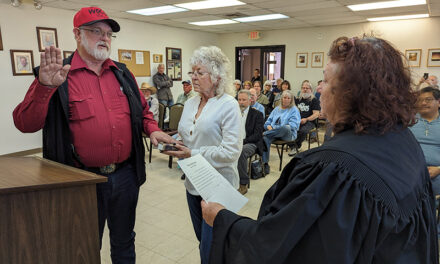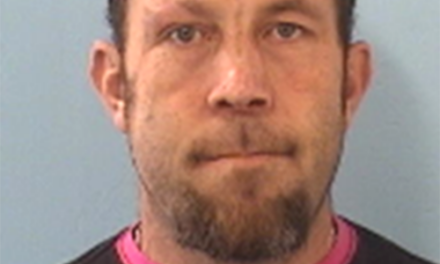The judicial system is a complicated one, involving many players — from the arresting officer, to defense attorneys and prosecutors, to judges and juries.
Since an amendment to the New Mexico Constitution passed in 2016, many community members have felt like the system has become more unreliable, favoring those who commit crimes.
The intention of the amendment was to prevent people from being held for an indeterminate amount of time in jail just because they couldn’t afford bail. This has led to alleged offenders being released and possibly committing more crimes in the community.
Last month, the Los Lunas Police Department sponsored a forum on “The Revolving Door of Crime and Drugs in Our Community,” bring together legislators, judges, defense attorneys and prosecutors in an attempt to answer residents’ questions about how the system works and what the rules are.
About 30 people attended the forum and asked a variety of questions. One member of the audience asked how due process was balanced with public safety.
“It seems like due process trumps public safety. The term ‘fair and equitable’ has been used here. When does common sense prevail, or is there no common sense in the law?”
Barbara Romo, the chief deputy for the 13th Judicial District Attorney’s Office, said everyone is entitled to due process.
“It’s there to protect us. Our system is set up to protect the rights of the accused and we have victim’s rights,” she said. “Judges are charged with balancing those rights. They have to listen to both sides.”
The chief deputy continued, reminding the audience that people charged with a crime haven’t been convicted.
“Judges have to look at both sides, weigh the pros and cons of releasing someone,” she said. “That’s hard to explain to victims. The judge is not going to hear just our side, just like a jury not going to hear just ours. We have an adversarial process and the judge makes sure we all follow the rules.”
Los Lunas Magistrate Tina Garcia said common sense plays a big role in how she does her job.
“We all three (Valencia County magistrates) live here,” Garcia said. “It is our job to impose sentence if someone is found guilty.
“At the beginning stages, where a lot of community members seem to have concerns, they’ve not been convicted. We have to balance that, and we do that by following the rules. It can be a tough decision — maybe not even the decision we want to make — but it’s a decision we’ve been put in that position to make.”
Sen. Greg Baca noted that while much of the discussion was focused on the constitutional amendment, the issue coming into play was the rules drafted afterward.
“When a change to the constitution happens, then there is rule making. That is not controlled by the Legislature. It happens behind the scenes when experts get together and make the rules,” Baca said. “That constitutional amendment looked different when it went through the rule making. I think the people up here would agree, the magistrates don’t want to put dangerous people on the street. They are held to the rules.”
An audience member asked if the amendment could be repealed and if so, how.
Rep. Kelly Fajardo said it could be by a public vote.
“It was passed by voters by 87 percent. And if anybody voted for it , their understanding was this — if you are charged with a crime, you shouldn’t be forced to stay in jail because of poverty,” Fajardo said. “One guy can afford a couple thousand dollars and the other can’t. What we were told was one thing. What happened was another. I kind of feel like it was a bait and switch.
“The Supreme Court could make rule changes, but I don’t think they will.”
One person asked about cases where a person had multiple DWI convictions but was out of custody and possibly then went on to kill someone in a DWI crash.
Belen Magistrate John Chavez said during his time on the bench, he’s learned that “you can’t punish someone into sobriety. We are not able to put someone in jail and when they get out, they’ll be sober.”
Chavez explained that judges are sentencing offenders appropriately, pointing out what he called a “tragically ironic” DWI crash that killed the brother of a district court judge. The judge had previously sentenced the driver in that accident to a prison term of six years, the mandatory sentence, Chavez said.
“He was released, and within two weeks struck a motorcyclist, the brother of the judge,” he said. “The judge absolutely followed the law. He gave him six years, as required. That individual never ever got any help.”
As the victim of DWI, Los Lunas Police Department Lt. Lisa Valenzuela-Medina, the forum organizer, said the driver who killed her sister had seven prior DWIs.
“At that time, the maximum sentence was three years. He only got more because of prior convictions,” Valenzuela-Medina said. “Even as victims, we have to understand there are guidelines. Judges cannot sentence to whatever they want.”
One audience member said they heard the 13th Judicial District Attorney’s Office was overloaded and cases were often pushed back.
“How do you decide which cases are most important, and which ones to push back or put on hold?”
Joshua Jimenez, a former assistant district attorney for the second and 13th judicial districts and is now in private practice in Los Lunas, said it wasn’t just the 13th that was overloaded, but DAs across New Mexico.
“When making the determination as to which cases to make priority, we should go after the most dangerous offenders, those who area substantial risk to the community like homicide and aggravated battery,” Jimenez said. “I think that should extend to residential burglaries and breaking and entering in general. It is inherently dangerous, breaking into someone’s home.”
Jiminez said DWIs should also be high priority since the alleged offender is putting themselves in a position to injure someone.
An audience member asked what people in the community could do to prevent crime.
Chavez said the first thing was to be a good family member, a good parent.
“That might sound cheesy and that won’t prevent everything, but being active with your family is a huge contributor to keeping your community safe,” he said. “Being a good neighbor, looking out for each other. Then being active and responsive to the wonderful law enforcement officers we have in the community.
“People think the criminal justice system is geared a bit against you if you are a victim or witness. I hate to say it, but families that are the victim of homicide, don’t expect to get closure. What it can do, when we prosecute a case, is to bring about a result that the law allows.
“Be active in the case, interested in it being prosecuted. While none of us on this panel have complete control over this system, being an active participant can give someone a chance to close out a bad portion of their life.”
Julia M. Dendinger began working at the VCNB in 2006. She covers Valencia County government, Belen Consolidated Schools and the village of Bosque Farms. She is a member of the Society of Professional Journalists Rio Grande chapter’s board of directors.



















